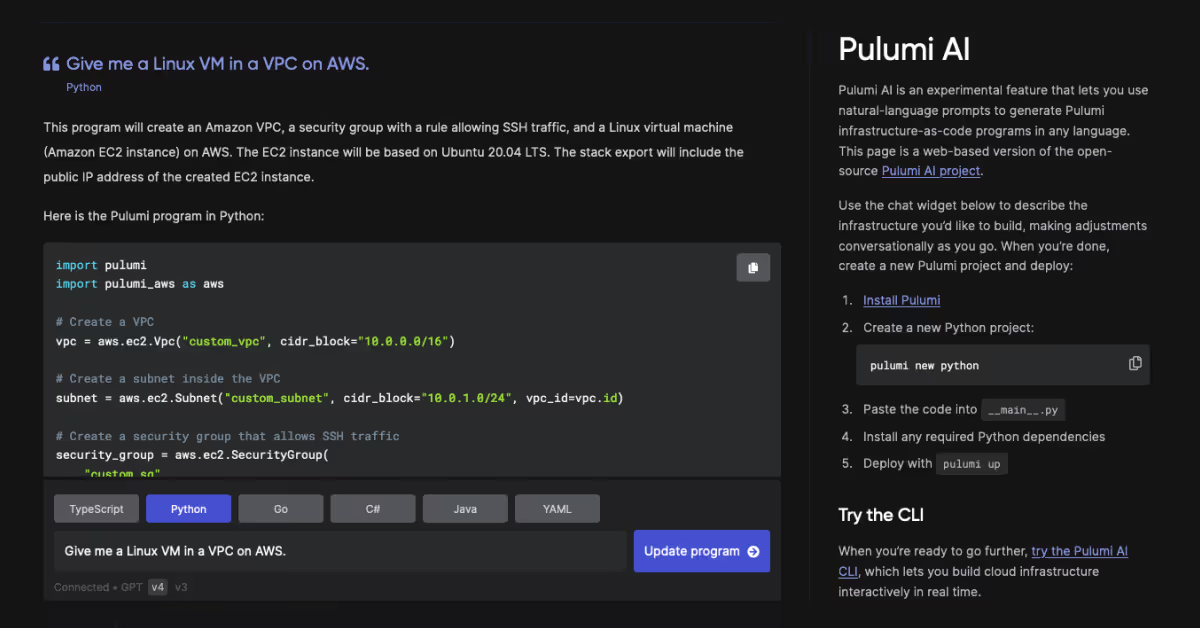
Our vision is to transform the way cloud infrastructure is created and managed, making it accessible, streamlined, and deeply integrated within modern software development. We aim to unite the power of programming with the complexities of cloud operations to unlock new possibilities for engineers and enterprises worldwide.
By harnessing the versatility of general-purpose languages and pioneering AI-driven automation, we are crafting a future where infrastructure is no longer a barrier but a catalyst for innovation and speed. We build technology that simplifies, automates, and secures cloud environments, empowering teams to focus on what truly matters—building exceptional applications that shape the future.
Our mission is to create a seamless experience that bridges development and operations, enabling agility at scale, fostering collaboration, and driving the cloud evolution forward. Through intelligent automation and a developer-centric approach, we strive to make cloud infrastructure not just manageable, but a source of competitive advantage in an ever-evolving technological landscape.
Our Review
When we first explored Pulumi, we'll admit we were skeptical. Another infrastructure-as-code platform? Really? But after digging into what Joe Duffy and Eric Rudder built since leaving Microsoft in 2017, we found ourselves genuinely impressed by their approach to solving cloud complexity.
The Seattle-based company has raised nearly $100 million for good reason—they're doing something fundamentally different in the IaC space.
What Makes It Click
Here's where Pulumi gets clever: instead of forcing you to learn yet another domain-specific language, they let you use the programming languages you already know. TypeScript, Python, Go, C#—take your pick. This isn't just a nice-to-have feature; it's transformative for developer productivity.
We love that you get full IDE support, testing frameworks, and access to package ecosystems. It's infrastructure management that actually feels like software development, not wrestling with YAML files or learning cryptic syntax.
The AI Twist That Surprised Us
Neo, their AI agent for infrastructure, caught our attention immediately. It's not just generating boilerplate code—this thing can review pull requests, debug deployments, and execute complex infrastructure tasks end-to-end. We've seen plenty of AI marketing fluff lately, but Pulumi's implementation feels practical and genuinely useful.
The fact that customers like Panther Labs are seeing 10x deployment speed improvements and 50% code reduction isn't just impressive—it's the kind of ROI that makes CFOs happy.
Who Should Pay Attention
If you're an engineering team tired of context-switching between application code and infrastructure scripts, Pulumi deserves serious consideration. We think it's particularly compelling for organizations with multi-cloud strategies or those prioritizing developer velocity.
The SOC 2 Type II certification and enterprise-grade security features mean it's not just for startups—large organizations can confidently adopt this approach without compromising compliance.
At $48.7 million in annual revenue and growing fast, Pulumi clearly resonates with teams who want infrastructure that feels less like infrastructure and more like, well, actual software engineering.
Feature
Manage cloud infrastructure with programming languages like TypeScript, Python, Go, C#, Java
Support for over 150 cloud providers including AWS, Azure, Google Cloud, Kubernetes
Pulumi CLI for deployment and management
Pulumi Automation API for programmatic workflow integration
AI-driven Neo agent for infrastructure generation, review, and debugging
Encrypted secrets and SOC 2 Type II certified security and compliance
Environment isolation with Pulumi Stack for dev, staging, production








